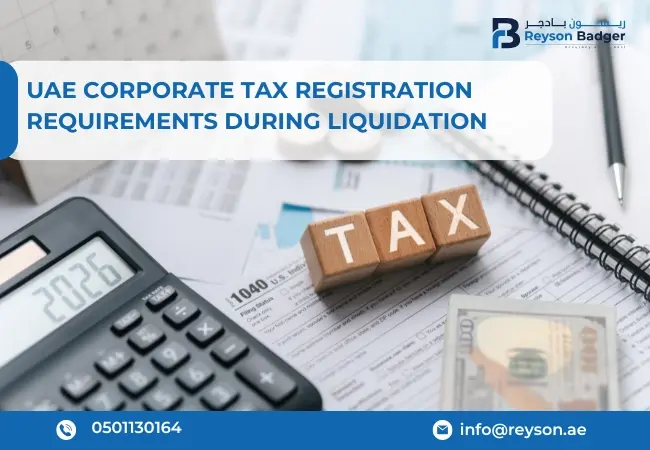As the corporate tax regime of the United Arab Emirates is finally taking its final shape, businesses have been carrying out registration for taxes when a company goes through winding down or liquidation procedures, either compulsory or voluntary. This, in turn, leads to the identification of certain problems related to taxation that warrant special treatment. Noncompliance with such would attract huge fines, reputational consequences, and operational dislocation for a business.
It elaborates upon the process of liquidation registration in UAE corporates with issues including notification, filing, and de-registration. From this article, businesses may learn to make compliance much easier and thereby reduce any risk while staying focused on a successful transition.
UAE Corporate Tax Overview
Corporate tax in UAE has transformed the fiscal landscape of the country. Below is an overview of the key aspects of UAE corporate tax, including its structure, rates, and registration requirements, followed by an explanation of the liquidation process.
The UAE government declared that a federal corporate tax (CT) on business profits will be introduced effective from June 1, 2023. Corporate tax in the UAE is being implemented according to international best practices to increase tax transparency and compliance in line with the international framework adopted by the OECD. The corporate tax law was finally established by Federal Decree-Law No. (47) of 2022, outlining the tax regime for businesses in the UAE.
Taxable Income and Rates
Under the new corporate tax regime:
- Taxable income up to AED 375,000 will be exempted from taxation.
- 9% will be levied on the taxable income above AED 375,000.
2. Free Zone Entities: Qualifying Free Zone Persons shall enjoy 0% on qualifying income but shall be liable for 9% on non-qualifying income.
Registration Requirements
All taxable persons and businesses are required to register with the FTA for corporate tax. These include;
- Resident Persons: This pertains to juridical persons who are incorporated within the UAE or foreign entities that are managed from within the UAE.
- Non-Resident Persons: These pertain to persons with a permanent establishment within the UAE or those earning income sourced within the UAE.
Liquidation Process in the UAE
Liquidation is the process by which a firm is dissolved, and all its properties are handed out to its creditors and shareholders. At times, it becomes a compulsory dissolution of the firm because of unfavorable circumstances while at other times the company does it at their will.
Liquidation Procedures
- The first category includes liquidation by shareholder action. When shareholders in the firm realize that its mission is achieved or can no longer perform due to insufficient capital for the day-to-day activities.
- Compulsory Liquidation: In this case, a court makes an order to liquidate a company because it becomes insolvent or fails to meet its legal obligations.
Liquidation Process
- Board Resolution: Voluntary liquidation requires a resolution of the board of directors.
- Appointment of Liquidator: The process of liquidation will be supervised by a liquidator, who will take control of assets and settle all debts.
- Notify creditors and advertise the bankruptcy of the corporation with relevant parties.
- Evaluating assets that are owned by a firm and sold at disposal during liquidation in paying obligations.
- Payables of claimants: Payment on pro-rata ratio for surplus from asset's proceeds realized.
- Final Account and liquidation: Accounting statements relating the whole process within the phase of liquidation with other requirements to dissolve.
UAE market entrants and participators must be aware of these processes since compliance with corporate tax laws and handling liquidation properly can have a great influence on financial health and legal standing.
Notification Requirements to the Federal Tax Authority (FTA)
- Notify the FTA of the cessation of liquidation through EmaraTax as soon as reasonably practicable and in line with FTA deregistration guidance.
- File the final corporate tax return in EmaraTax in accordance with FTA rules (generally within nine months after the end of the Tax Period that includes the liquidation).
- Provide proof of liquidation resolution or court order.
Submission of Final Tax Return
File the final tax return (Form 200) within 120 days from liquidation commencement.
Include details of:
- Taxable income during the liquidation period.
- Taxes payable or refundable.
- Assets sold or distributed during liquidation.
Payment of Taxes Due
- Pay taxes due within 120 days from liquidation commencement.
- Include penalties and interest, if applicable.
De-registration from Tax Registry
- Apply for tax deregistration promptly after liquidation, the FTA expects deregistration applications shortly after cessation
- Submit Form 700 (De-registration Application) along with supporting documents.
Provide proof of:
- Liquidation completion.
- Final tax return submission.
- Payment of taxes due.
Additional Requirements
- Maintain records for 5 years from liquidation completion.
- Provide information and documents to FTA upon request.
FTA Guidelines and Regulations
- Cabinet Decision No. (38) of 2022 on Corporate Tax.
- Federal Decree-Law No. (47) of 2022 on Taxation of Corporations.
Timeline
- Notification to FTA: 30 days from liquidation commencement.
- Final tax return submission: 120 days from liquidation commencement.
- Payment of taxes due: 120 days from liquidation commencement.
- De-registration application: 30 days from completing liquidation.
Penalties for Non-Compliance
AED 10,000 for late corporate-tax registration; late tax-return filing carries AED 500 per month for the first 12 months and AED 1,000 per month thereafter (with caps for some violations); payment defaults attract interest/administrative penalties as set out in the Cabinet Decision and Tax Procedures Law.
Corporate Tax Obligations in Liquidation
- Tax Liabilities in Liquidation
Even if the activities of such firms existed before the date that this tax came into effect, firms planning liquidation will be required to pay corporate tax if such firms have earned any taxable income from inception to date and even in cases when such firms close. The corporate tax shall apply throughout to taxable income derived and to report to and pay the FTA its taxes by filling all required tax returns in addition to the final liquidation accounts.
- Legal Implications for Failure to Comply:
Failure to register, file returns, or pay outstanding taxes will attract penalties like a fine of AED 10,000 in cases of late registration or deregistration. The fines are more cumulative for delayed return filing, thereby complicating the winding-up process.
- Effects on Shareholders and Stakeholders:
Liquidation impacts the share and stakeholders both at the financial and operational dimensions. Shareholders risk losing if the assets available would not be enough to cater for the debts. The staff, creditors, and many other stakeholders may lose cash or services and become less stable.
Documentation and Procedures
- Tax Obligations in the Course of Liquidation:
If a company activates any operations before the date when the corporation tax is applicable, it would have to register and obtain a corporate tax. The corporate tax is still chargeable on the taxable income earned by the business that is in the process of liquidating the whole corporation. This requires submission of tax returns and payment of taxes still to be paid as provided for according to the Federal Decree-Law No. 47 of 2022 and the regulations by the FTA regarding tax obligations.
- Subjection to Penalties on Non-Compliance:
Registration, filing of returns, or remittance of tax default may attract penalties some of which include AED 10,000 for failure to register on time or for deregistration. Failure to here incur additional fines for late filing of tax returns which may be more severe in degree making the whole process of liquidation a painstaking one.
- Impact on Equity Holders and Interest Holders:
The process of liquidation has implications for all equity holders and interest holders in both financial and operational dimensions. Shareholders will incur a risk of loss if the remaining assets are not able to cover the outstanding liabilities. Payments or services to employees, creditors, and the like can be cut off, causing instability to the affected stakeholders.
Documentation and Procedures for Corporate Tax Registration and Filing:
- Documents to have for Registration: The following documents should be attached to any application made for tax registration during the period of liquidation:
- A duly filled application for tax registration,
- Evidence of cessation of business (such as a board resolution or court order),
- Final accounts, if any, assessing the last position of the entity,
Any other documents that FTA may require for the particular taxpayer to be compliant.
- Tax Returns and Payments Procedures: There is a requirement for companies liable to tax to complete and submit a corporate tax return, within nine months after the end of the period covered by the tax return, together with any tax payable thereon. Adhering to these deadlines is very crucial to avoid incurring penalties in the process.
- FTA Guidelines and Regulations: In the UAE, corporate tax registration during liquidation is governed by Federal Decree-Law No. (47) of 2022 on Taxation of Corporations and Cabinet Decision No. (38) of 2022 on Corporate Tax. The Federal Tax Authority (FTA) has issued guidelines outlining the requirements for businesses undergoing liquidation, including notification, tax return submission, and payment obligations. Specifically, companies must notify the FTA within 30 days, submit a final tax return (Form 200) within 120 days, and pay taxes due within the same timeframe. The FTA also requires record-keeping for five years and imposes penalties for non-compliance, emphasizing the importance of adherence to these regulations.
Conclusion
Liquidation about the registration of UAE corporate tax is not a less complicated process, but much care and attention to detail must be taken and strictly comply with the requirements of the law. The most significant steps include notification to the Federal Tax Authority within 30 days, final submission of tax returns, paying taxes due, and de-registering from the tax registry. It would be better to seek professional help from experts such as Reyes Badger for correctness and compliance. Our experienced tax professionals can walk you through the liquidation process, ensuring that the risk of penalties and liabilities is minimized. Avoid non-compliance; call Reyson Badger today to schedule a consultation and ensure a smooth transition.
Email id: info@reyson.ae
Contact no: +971-55-487-4391
 The Federal Tax Authority (FTA) has announced that businesses must complete Corporate Tax registration within 90 days from the Date of Incorporation / MOA.
The Federal Tax Authority (FTA) has announced that businesses must complete Corporate Tax registration within 90 days from the Date of Incorporation / MOA.













